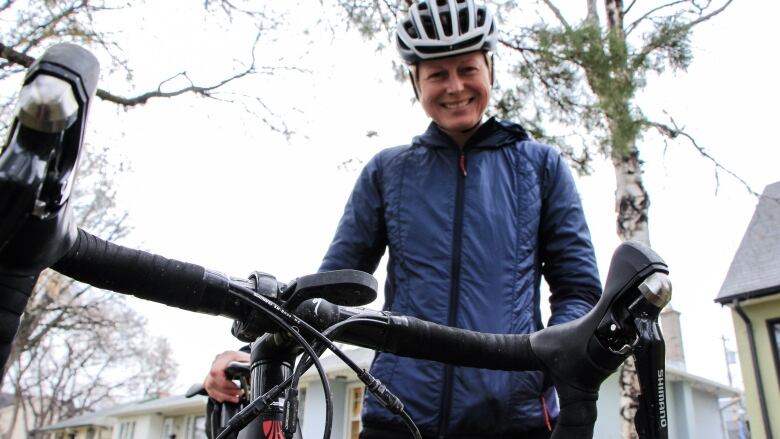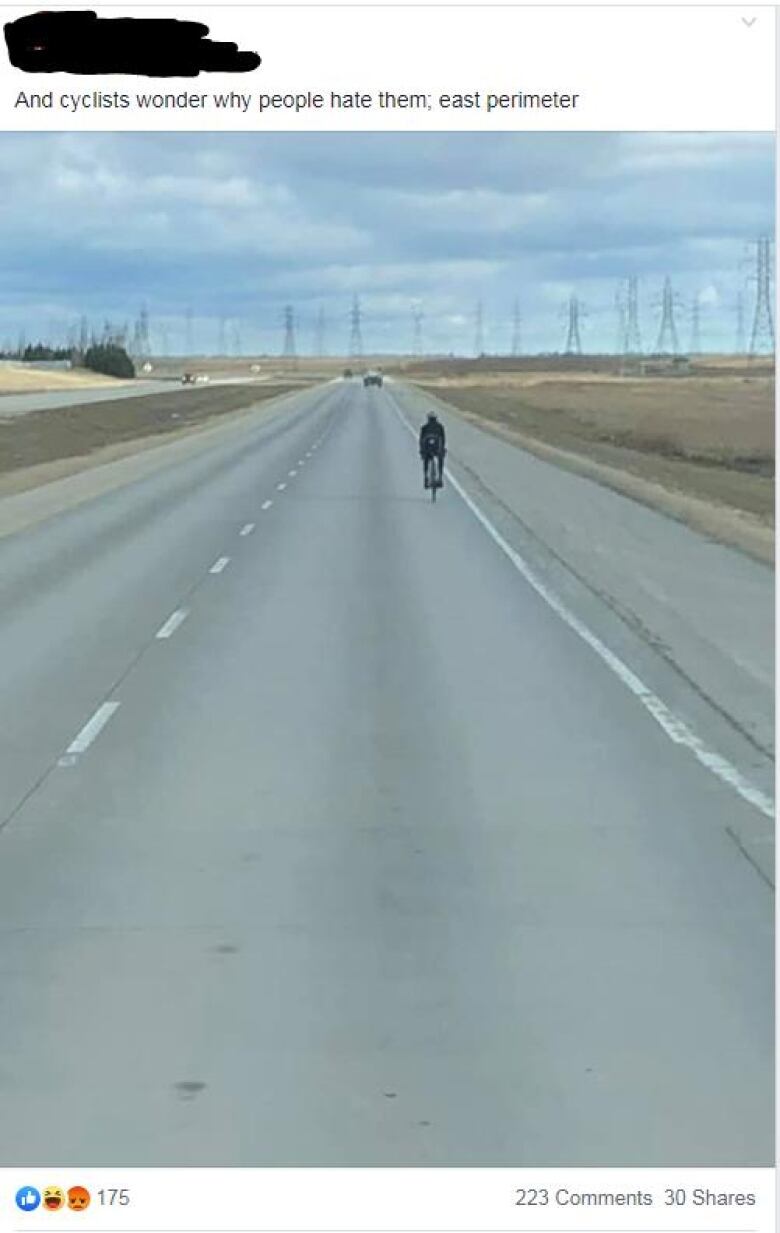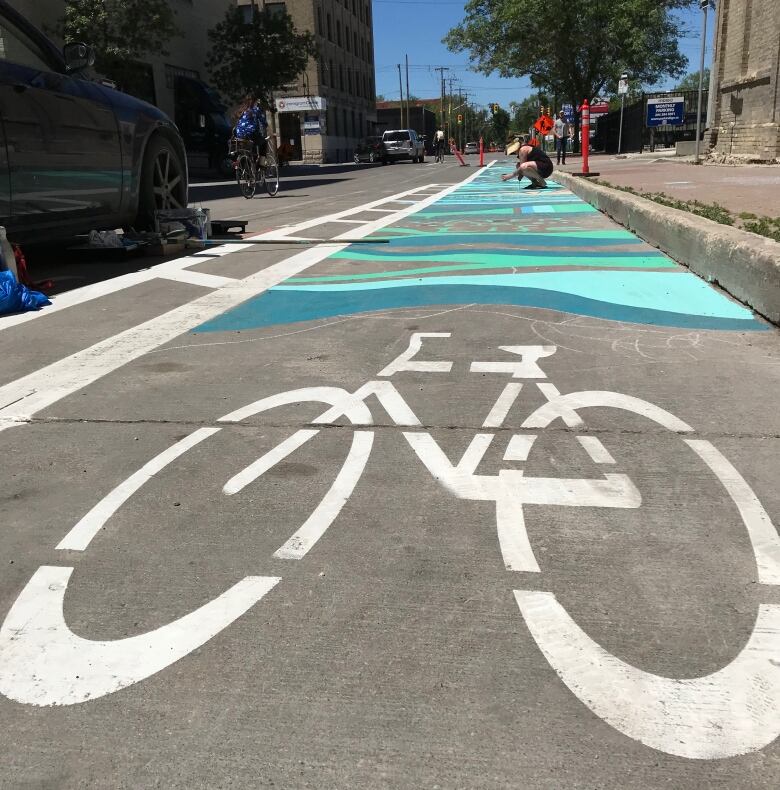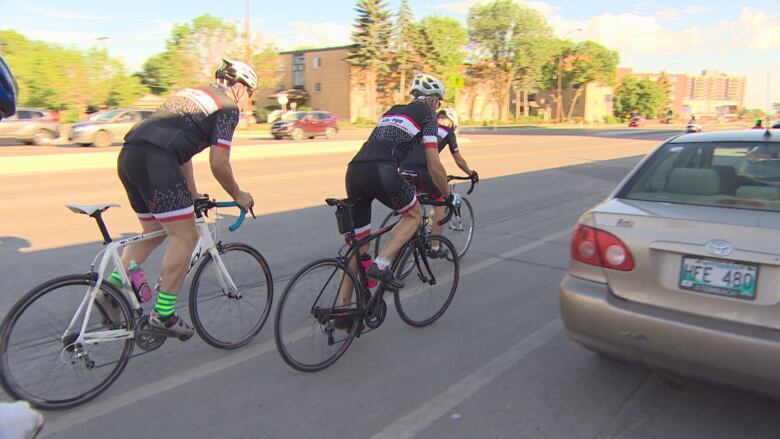'We live in a car culture': Winnipeg cyclist not surprised by study that says drivers 'dehumanize' riders
More than half of drivers dehumanized cyclists, thinking of them as 'less than human,' Australian study says

As North American cities, including Winnipeg, work to make more room for cyclists on their roads, one recent study says the attitudes of drivers are still putting bike riders at risk.
The study by Australian researchers, published last month in a transportation journal, says that cyclists are often considered "less than fullyhuman" by many non-cyclists.
One Winnipeg cyclist says she's seen the same thing herebut it's a problem in many places.
"I don't think this is a problem particular to this city or province.I think it's a North American thing.I think it's cultural," saidKarin McSherry, the co-founder and vice-president of Winnipeg's Velodonnas a women's cycling club.
"We live in a car culture."
The peer-reviewed study, conducted by Melbourne's Monash University, the Queensland University of Technology and theUniversity of Melbourne, measured the attitudes of 442 participantsboth cyclists and non-cycliststoward bike riders. It specifically asked them to rate how "human" the cyclists were perceived to be, using a visual scale.
Fifty-five per cent of non-cyclists and 30 per cent of cyclists rated bike riders as less than human, the study found.
"When you don't think someone is 'fully' human, it's easier to justify hatred or aggression towards them," lead researcher AlexaDelbosc said in a post on Monash University's website.
That's an issue cyclists here in Manitoba say they face too.

An April 30 postby a user on a Manitoba-based Facebook group foroffroad vehicle enthusiastsfeatured a photo identified asa bike rider onthe Perimeter Highway in Winnipeg, with the comment "And cyclists wonder why people hate them."
More than 200 comments followed. While some defended the rider, otherssaid the cyclist should be on the paved shoulder, risked becoming"a skidmark," or made referenceto intentionally hitting the cyclist.The rider was calleda "lowlife," among othernames.
For McSherry, it's become a common occurrence to see jokes referencing harm to cyclists.
"We have little choice but to ride our bikes on the road," she said.
"We're extremely vulnerable out there, and it's extremely concerning to hear that there are some drivers who think like that."
Advocates want more cycling infrastructure
Manitoba Public Insurance saystwo cyclists are killedin Manitoba on average each year, while 144 are injured in collisions.
McSherry doesn't commute to work by bike, but is often on the roads. She said shefeels negative sentiments towardcyclists makemany potential ridersapprehensive.
"It's probably stopping a lot of people from driving their bikes on the road. In this city there just isn't the bike lanes [there are] in Vancouver, or places like Edmonton who are building that infrastructure," she said.
"People feel very entitled because they need to be where they need to be."

In 2015, Edmonton adopted a plan called Vision Zero,focused on methodsto reduce the number of pedestrian deaths in the city to zero. Part of that plan has included investmentin bike lanes. The city says between 2015 and 2018, cyclist injuries dropped 29 per centfrom 158 to 112.
A 2018 Angus Reid Institute poll found two-thirds of Winnipeggers polledsaidthere are too few bike lanes in the city, and 76 per cent said separated bike lanes are a good thing higher than the average of 65 per cent Canada-wide.
In Winnipeg, there are a total of 400 kilometres of bike pathsbut only 13 kilometres are protected, on-street bike lanes, according tothe city.
By comparison, the City of Vancouver says it has27.8 kilometres ofprotected bike lanes.
McSherry believesif more people were trained to navigate the streets with their bikes, they may feel more compassion towardtheir fellow Manitobansa sentiment backed up by the Australian study, whichsaid driverswho also sometimes bikedwere calmer when dealing with cyclists.
"When you get behind the wheel of your vehicle, it changes your attitude. They want to get to where they're going as quickly as possible, and if you're slowing them down, people get angry," McSherry said.
"Walking a mile in our shoes would change minds."
Cyclist in the right, but RCMPurges caution
Staff Sgt. Kyle McFadyen with ManitobaRCMP's traffic services says the temperament displayedby drivers toward cyclists especially in the recentFacebookpost isa cause for concern.
McFadyen said that the cyclist in that photo is not in the wrong.
"The cyclist is not breaking any laws by riding on the road surface. However, if there is a safer way, we would encourage that,"he said in an emailed statement.
Highways can be tricky to navigate, according to the RCMP, and cyclists like the one pictured on the Perimeter Highway need to be aware of the hazards of the road.
"This is normally a very busy roadway and there are incidents where drivers are exceeding the speed limit," McFadyen wrote.
"Any time there is an obstruction on a busy roadway, regardless of what that obstruction is, there is an increased risk of collision."
McFadyensaidthe best things a cyclistcan do are ensure they're visible to drivers, wear bright clothing, and be aware of their surroundings at all times.

While McSherry understands there is a shared responsibility, she wants motorists to know that the vehicle they're in can cause life-changing damage.
"You don't even need to have that kind of [negative] attitude," she said.
"At the end of it, you're driving a lethal weapon."












_(720p).jpg)


 OFFICIAL HD MUSIC VIDEO.jpg)
.jpg)



























































































